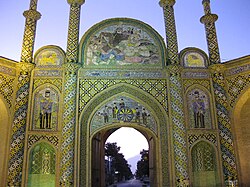Semnan (city)
|
Semnan سمنان Semān |
||
|---|---|---|
| city | ||

Entrance to the Citadel of Semnan
|
||
|
||
| Nickname(s): Capital of Qomess | ||
| Motto: Welcome; خوش امیچین | ||
| Coordinates: 35°34′22″N 53°23′50″E / 35.57278°N 53.39722°ECoordinates: 35°34′22″N 53°23′50″E / 35.57278°N 53.39722°E | ||
| Country |
|
|
| Province | Semnan | |
| County | Semnan | |
| Bakhsh | Central | |
| Settled | circa 240BCE by Parni tribesmen | |
| Incorporated (city) | 1926 | |
| Government | ||
| • Type | Municipality | |
| • Mayor | Kazem Sharbatdar | |
| Elevation | 1,130 m (3,707 ft) | |
| Population (2011) | ||
| • Total | 153,680 | |
| Population Data from 2011 Census | ||
| Time zone | IRST (UTC+3:30) | |
| • Summer (DST) | IRDT (UTC+4:30) | |
| Area code(s) | +98 231 | |
| Main Languages | Persian, Semnani | |
| Website | http://www.semnan.ir | |
Semnan (pronounced [semˈnɒːn]; Persian: سمنان, also Romanized as Semnān and Samnān) is the capital city of Semnan Province, Iran. Its population was 153,680 people and 36,298 families as of the 2011 census. Semnan is located 216 kilometers east of Tehran in north central Iran. It is home to Semnani languages and is known as Seman locally.
The city offer various recreational activities, historical and religious sites, festivals, gardens and parks, colleges and universities, and Semnani culture. The city serves as the cultural and political capital of the Semnan Province. The city's main souvenirs are daffodil flowers, Shirmal pastry, Kolüçe cookies, kilim rugs, and shortbread.
There are several theories which seek to explain the origin of the name Semnan.
The city of Semnan is situated at 1,138 metres above sea level just south of the foothills of the Alborz Mountains, bordering the Kavir Desert to the south of the city. However, the Golrudbar river, which begins to the north of Shahmirzad, and other creeks have historically provided a reliable supply of water for a civil establishment; irregation methods since ancient times have allowed the people of Semnan to drink clean water, to raise livestock such as cattle and sheep, and to adopt agricultural practices. Unlike modern day Tehran, the city of Semnan is relatively flat.
The city of Semnan enjoys the traditional four seasons of spring, summer, winter, and autumn each year.
...
Wikipedia


